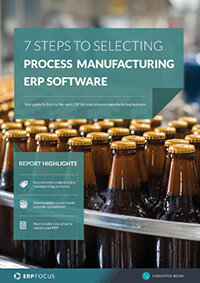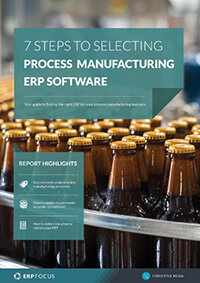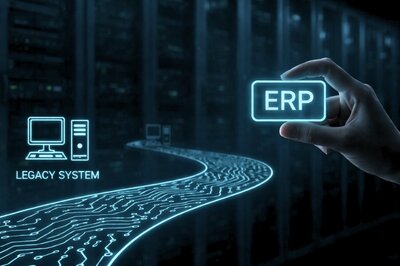Maybe it’s time to invest in process manufacturing ERP?
Maybe next year . . . or the year after.” Many process manufacturers are in a good position to invest in ERP software at some point in the near future. However, many have put off the project for years, reluctant to make the financial and human resource commitment. What indications do you, as a process manufacturer, have that it’s time––or perhaps, well beyond time––to invest in ERP software for your company?
Loss of productivity and profitability
As your manufacturing company grows in size and complexity, it can become increasingly difficult to share and manage information throughout the operation. Because of this, many departments manage information in silos, with their own documents and data storage, processes, procedures, and equipment. In other words, the left hand has a difficult time knowing what the right hand is doing.
Process manufacturing ERP is designed to increase efficiency, productivity, and consequently, profitability by providing management visibility across the entire organization. This type of software solution can seamlessly link, and make visible in real-time, all critical business functions and information. Data is collected, stored, tracked, managed, and interpreted in a centralized database, with no redundancy. Integrated business intelligence (BI) software can analyze and visualize data, generating standard and shared reports, critical for analyzing batch yields, cost fluctuations or quality issues. If implemented correctly, an ERP software solution will provide a Return-on-Investment (ROI) within a relatively short period of time.
Frustrating manual methods and/or manufacturing software
Manual, disparate systems––Quickbooks™, multiple Microsoft® Excel™ spreadsheets, and pen and paper––are inefficient and error-prone as the volume and complexity of data grows. Manual systems, coupled with non-manufacturing software––accounting software, customer relationship management (CRM) software, non-manufacturing ERP software––are often cumbersome and break down when business growth or moderate demands require up-to-the-minute information for planning and decision-making.
Recommended reading: 7 steps to selecting process manufacturing ERP
ERP systems not specifically designed for process manufacturers, legacy systems, and software designed in-house for a particular functionmay be obsolete by today’s standards, cumbersome to maintain, lacking in scale-ability to accommodate growth, or otherwise inadequate for today’s needs. ERP designed for your industry streamlines an operation through automation, integrated planning, and the elimination of redundant “hands-on” or manual activity, including the need to re-enter data, handle duplication, or double-check conflicting data. A fully-integrated ERP system––designed specifically for process manufacturers and operating across the organization in real time––enhances the technology experience and decision-making ability - such as providing input, variance and quality information during the course of a production run, instead of post-production - not only for managers but for all users, and positively impacts your bottom line.
Poor customer relationship management
Consumers are critical to the success of a manufacturing company. Your company wants to keep consumers/customers satisfied and exceed expectations whenever possible. These customer relationships need to be managed and synchronized throughout the lifecycle of your product. ERP can help process manufacturers record and store accurate, comprehensive customer data, including contact information, sales order, item and lot history, purchase volume, fluctuations, profitability, etc. Helping to manage and nurture the relationship, as well as the priority attention a customer receives, is very important for inspiring loyalty from your best customers.
Lack of batch controls
Numerous process manufacturers offer many different products and have difficulty with the sheer volume of recipes or formulas they must manage. Proper management of recipes or formulas is critical to maintain consistency between successive batches, keeping the integrity of recipes during changeovers, or managing make-to-order (MTO) customization services for customers. ERP software will manage and secure complex recipes, facilitate testing of new recipes, accommodate custom recipes, create consistency from one batch to another, support co-products and by-products, and help monitor the quality and consistency of ingredients.
Managing inventory
Inventory management can be frustrating and expensive when it’s done inefficiently. Manufacturers want to ensure their materials and products turn-over at a decent rate to prevent spoilage and to reduce the costs of warehousing. ERP can streamline an operation, using the Material Requirements Planning (MRP) process, ensuring the material and production needs are met effectively and efficiently while keeping inventory carrying costs low and turnover at a sustainable rate. An optional automated warehouse solution (AWS) functionality utilizes barcodes, purchase order receipts, inventory transfers, batch ticket material issues and returns, pallet tracking, and sales order shipments, etc.
Operating in a regulated world
It is imperative that process manufacturing operations stay socially responsible and compliant with government regulations. The public must trust the integrity of the company’s products and brand, and the government must verify the company is compliant with all regulations pertinent to their specific industry. If a manufacturer disappoints consumers, sales will plummet. If a manufacturer disappoints the U.S. government, it suffers fines, or worse–a shutdown.
An industry-specific, integrated ERP software solution should respond to the demanding and regulated world you do business in, providing features such as quality control (QC), both backward and forward lot traceability during a contamination event, complete and accurate labeling, certification after analysis, product/environmental/employee safety compliance, and other support of regulatory requirements to meet and maintain standards.
Evaluating budget; how to afford a solution
Some small or start-up process manufacturers simply don’t believe they have the budget, or the need, to invest in an ERP software solution. If you are one of these manufacturing types, keep in mind that an ERP solution is available in many forms, including financing an on-premise solution, known as SaaS (software-as-a-service) or Cloud ERP, may be an option for you. The cloud computing environment (CCE) consists of remote servers and off-site computer networks that provide shared, centralized data storage, and online access to various applications. Infrastructure, platform, applications, maintenance, and security are the responsibility of the ERP service provider. Thus, the biggest benefit to the manufacturer is the reduction of sizable up-front costs, both in hardware, backup system, and networking infrastructure.
These seven business challenges––and others, not mentioned in this article––may indicate that it’s time to invest in an ERP software solution to meet your process manufacturing needs. In fact, ERP software meant for your industry has the potential to be the best decision your company makes this year in terms of ROI. Maybe, the time to act is now.
Free white paper

7 Steps to Selecting Process Manufacturing ERP
Your guide to finding the right ERP software for your process manufacturing business

Related articles
-

When is it time to replace a legacy ERP system?
Replacing your legacy ERP system with new software can revitalize your business operations.
-

CMMC Compliance: What Aerospace and Defense Manufacturers Need to Know
Key insights on CMMC compliance, deadlines, and securing DoD contracts with CMMC 2.0 certificatio...
-

The best ERP systems for process manufacturing
Consider these ERP systems when selecting your next process manufacturing ERP

